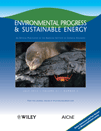
Environmental Progress & Sustainable Energy
Scope & Guideline
Championing research that fuels environmental stewardship.
Introduction
Aims and Scopes
- Sustainable Energy Systems:
Research on renewable energy technologies including solar, wind, biomass, and geothermal systems aimed at improving energy efficiency and sustainability. - Environmental Remediation and Pollution Control:
Studies focused on innovative methods for the treatment and removal of pollutants from air, water, and soil, including bioremediation and advanced oxidation processes. - Waste Management and Circular Economy:
Exploration of waste valorization techniques, including recycling, composting, and conversion of waste into energy, emphasizing sustainable practices. - Material Science and Nanotechnology:
Research on the development of advanced materials, including nanomaterials for environmental applications such as adsorption and catalysis. - Sustainable Agriculture and Land Management:
Investigations into agricultural practices that enhance sustainability, reduce environmental impact, and improve soil health. - Energy Policy and Economic Analysis:
Analysis of energy policies, economic implications, and the socio-economic aspects of sustainable energy transition.
Trending and Emerging
- Climate Change Mitigation Strategies:
There is an increasing emphasis on research that addresses climate change impacts and mitigation strategies, particularly in energy generation and consumption. - Integration of Advanced Technologies:
Emerging themes include the integration of artificial intelligence, machine learning, and IoT technologies in energy systems and environmental monitoring. - Sustainable Biofuels and Biomass Utilization:
Research on biofuels, particularly those derived from waste and non-food sources, is gaining traction as an alternative to fossil fuels. - Water-Energy Nexus:
Studies focusing on the interconnectedness of water and energy resources are becoming more common, addressing the sustainability of both sectors. - Green Chemistry and Material Innovations:
Innovations in green chemistry, including the development of biodegradable materials and eco-friendly processes, are increasingly featured. - Public Health and Environmental Interactions:
Research linking environmental quality to public health outcomes is emerging as a critical area of study, reflecting the broader impacts of environmental changes.
Declining or Waning
- Traditional Fossil Fuel Technologies:
Research related to conventional fossil fuel extraction and use has decreased as the journal shifts focus towards renewable energy solutions and sustainable practices. - Basic Theoretical Studies:
Papers that focus purely on theoretical frameworks without practical application or case studies are less prevalent, as the journal emphasizes applied research and real-world solutions. - Conventional Waste Treatment Methods:
Studies on traditional waste treatment methods are declining, replaced by innovative and integrated approaches that align with circular economy principles.
Similar Journals

GLOBAL CHALLENGES
Uniting Disciplines to Tackle Global Issues.GLOBAL CHALLENGES is a leading multidisciplinary journal published by Wiley-V C H Verlag GmbH, dedicated to addressing the critical and complex issues faced by our global society today. Since its inception in 2017, the journal has embraced an Open Access model, ensuring that its innovative research is readily available to a wider audience, fostering collaboration and knowledge sharing. With an impressive Q1 ranking in the Multidisciplinary category for 2023, it positions itself among the top 8% of journals in the field, further solidified by its 93rd percentile rank in Scopus. Covering a broad range of topics that intersect various disciplines, the journal seeks to inspire researchers, professionals, and students alike to engage with and contribute to solutions that resonate across diverse sectors. The ongoing commitment to advancing scientific knowledge and tackling pressing global challenges makes GLOBAL CHALLENGES an essential resource for anyone invested in the future of our planet.

EcoMat
Advancing sustainability through innovative materials research.EcoMat, published by WILEY, stands as a cornerstone in the interdisciplinary fields of Chemistry and Materials Science. Since its inception in 2019, this Open Access journal has quickly garnered a prestigious reputation, achieving Q1 category rankings across various fields, including miscellaneous chemistry and physical and theoretical chemistry. With Scopus rankings reflecting its impact—ranked #7 in both Physical and Theoretical Chemistry and Chemistry (miscellaneous)—EcoMat publishes cutting-edge research that addresses critical challenges in material sustainability and innovation. Researchers, professionals, and students alike benefit from the rich content accessible from its Hoboken, NJ location, exemplifying a commitment to enhancing scholarly communication and collaboration whilst advancing the frontiers of material sciences and chemistry.
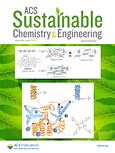
ACS Sustainable Chemistry & Engineering
Empowering researchers to shape a sustainable future.ACS Sustainable Chemistry & Engineering is a premier journal published by the American Chemical Society, dedicated to advancing knowledge and innovation in the fields of sustainable chemistry and engineering. With an impressive impact factor and a consistent ranking in the Q1 category across various disciplines such as Chemical Engineering, Chemistry, Environmental Chemistry, and Renewable Energy, this journal serves as a vital resource for researchers, professionals, and students alike. Since its inception in 2013, the journal has been committed to publishing high-quality, peer-reviewed articles that address the critical challenges of sustainability in chemistry and engineering. With no open-access option currently available, the journal emphasizes the importance of premium scholarly communication. As the field continues to evolve, ACS Sustainable Chemistry & Engineering remains at the forefront of providing cutting-edge research that impacts our understanding and application of sustainable practices in the chemical sciences.

MRS Energy & Sustainability
Fostering Interdisciplinary Insights for a Sustainable WorldMRS Energy & Sustainability is a premier interdisciplinary journal published by SpringerNature, focusing on advancing the understanding of energy systems and sustainability within the context of materials science and engineering. Since its inception in 2014, this journal has rapidly gained recognition in the academic landscape, achieving impressive rankings including Q1 in Electronic, Optical and Magnetic Materials and Mechanics of Materials, and Q2 in Energy Engineering and Power Technology as well as Renewable Energy, Sustainability and the Environment, as of 2023. The journal's ISSN is 2329-2229 and E-ISSN is 2329-2237. With a commitment to open access, it provides researchers and professionals with the latest findings and insights essential for guiding innovations in energy solutions and sustainable practices. The journal's global reach and high-impact reputation make it an invaluable resource for scientists, engineers, and policymakers dedicated to addressing the contemporary challenges of energy and sustainability. With a diverse scope and high Scopus rankings, MRS Energy & Sustainability continues to be at the forefront of research that shapes our energy future.

Problemele Energeticii Regionale
Fostering Collaborative Research in Power TechnologyProblemele Energeticii Regionale is a notable academic journal focused on the field of energy engineering and sustainable energy solutions, published by the Institute of Power Engineering, Academy of Sciences of Moldova. Since its inception in 2005, this Open Access journal has become a significant platform for disseminating research and innovations in various energy-related domains, including renewable solutions, fuel technology, and energy sustainability. While its impact factor metrics suggest it currently resides in the Q4 quartile category across multiple scopes—such as Energy Engineering, Power Technology, and Renewable Energy—it provides critical insights that can pave the way for advancements in regional energy challenges. Researchers, professionals, and students alike will find this journal an essential resource for understanding and contributing to the ongoing discourse in the energy sector. With its commitment to accessibility and knowledge sharing, Problemele Energeticii Regionale aims to foster a collaborative and informed community focused on energy innovation and sustainability.
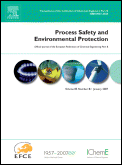
PROCESS SAFETY AND ENVIRONMENTAL PROTECTION
Driving excellence in safety management and environmental protection.PROCESS SAFETY AND ENVIRONMENTAL PROTECTION, published by Elsevier, is a premier academic journal dedicated to advancing the fields of chemical engineering, environmental science, and safety management. With an impressive impact factor, this esteemed journal undergoes a meticulous peer-review process and serves as a vital platform for researchers, professionals, and students seeking to disseminate cutting-edge research and innovative practices. Submissions are welcome in a wide scope of topics related to safety, risk, reliability, and environmental engineering, demonstrating its influence as a Q1 journal across multiple categories, including Environmental Chemistry and Safety, Risk, Reliability and Quality. By providing a rigorous analysis of current challenges and solutions in the domain since its inception in 1990, it continues to foster interdisciplinary collaboration and practical applications in the United Kingdom and beyond. With the journal not currently offering Open Access options, subscribers gain exclusive access to pivotal insights that shape industry standards and drive advancements in sustainable practices.

Energy Science & Engineering
Pioneering Insights in Energy and SafetyEnergy Science & Engineering, published by WILEY, serves as a leading open-access platform for the dissemination of high-quality research and insights in the fields of energy science, engineering, and safety. Since its inception in 2013, this esteemed journal has gained recognition for its impactful contributions, reflected in its impressive impact factor and notable Scopus rankings. As of 2023, it holds a distinguished Q2 category ranking in both Energy (miscellaneous) and Safety, Risk, Reliability, and Quality, showcasing its vital role in advancing interdisciplinary collaboration and innovation. With an open access model, the journal ensures that groundbreaking research reaches a wide audience, fostering discussion and knowledge sharing across academia and industry. The scope of the journal encompasses cutting-edge topics related to energy efficiency, renewable energy technologies, and risk management, making it an essential resource for researchers, professionals, and students aiming to contribute to the evolving landscape of energy science and enhance societal sustainability.

International Journal of Environmental Science and Technology
Exploring innovative pathways in environmental science.International Journal of Environmental Science and Technology, published by SPRINGER, stands as a premier platform for the dissemination of cutting-edge research in the fields of environmental science, technology, and engineering. With an impressive scope spanning from 2005 to 2024, this journal serves as a vital resource for academic and professional communities engaged in tackling pressing environmental challenges. It boasts a strong reputation, evidenced by its Q1 ranking in Agricultural and Biological Sciences and solid placements in Environmental Chemistry and Engineering. Researchers searching for high-impact studies will find the journal's contributions significant, as reflected in its rankings within Scopus: 34th percentile in Agricultural and Biological Sciences and notable standings in Environmental Engineering and Chemistry. Although the journal is not currently an Open Access resource, it maintains a commitment to academic rigor and innovation, making it indispensable for those devoted to advancing knowledge in environmental sustainability and technology.
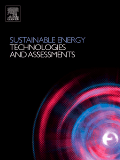
Sustainable Energy Technologies and Assessments
Contributing to a Sustainable Energy FutureSustainable Energy Technologies and Assessments is a prestigious journal published by ELSEVIER, based in the United Kingdom, focusing on the critical field of energy engineering and its intersection with sustainability. Since its inception in 2013, the journal has established itself as a leading platform for disseminating innovative research and assessments of sustainable energy technologies, earning a notable Q1 ranking in both Energy Engineering and Power Technology, as well as Renewable Energy, Sustainability, and the Environment. With an impressive Scopus ranking—#22 out of 272 in Energy Engineering and #40 out of 270 in Renewable Energy—this journal is essential for researchers and professionals seeking to advance their knowledge on cutting-edge developments and assessments in sustainable energy. Although the journal operates on a subscription basis, it remains committed to promoting high-quality research that aligns with global sustainability objectives. Researchers and students alike will find invaluable insights and data that shape the future of renewable energy technologies within these pages.
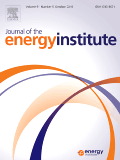
JOURNAL OF THE ENERGY INSTITUTE
Empowering Knowledge for a Greener TomorrowJOURNAL OF THE ENERGY INSTITUTE, published by Elsevier Science Ltd, is a leading interdisciplinary journal dedicated to the advancing fields of energy engineering and technology. With its ISSN 1743-9671 and E-ISSN 1746-0220, this journal has established a prominent reputation, evident from its impressive impact factor and strong rankings across multiple categories, achieving Q1 status in fields such as Condensed Matter Physics, Control and Systems Engineering, and Energy Engineering and Power Technology. As a pivotal resource for researchers, professionals, and students alike, the journal covers a comprehensive spectrum of topics in energy, including recent innovations in renewable energy technologies, sustainable practices, and advancements in fuel technologies. Researchers are encouraged to explore its open-access options for broad dissemination of knowledge, contributing to a more sustainable and energy-efficient future. With a converged history from 2004 to 2024, the JOURNAL OF THE ENERGY INSTITUTE remains a critical platform for cutting-edge research and development in the energy sector, promoting impactful solutions to global energy challenges.